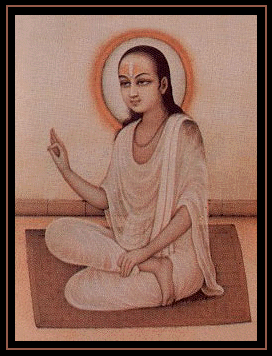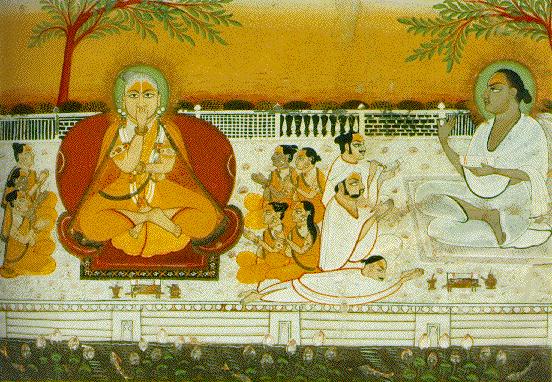

"Vallabha Bhatta was a great learned scholar of Vaisnavism. In the beginning he was very much devoted to Sri Caitanya Mahaprabhu, but since he thought that he could not receive proper respect from Him, he later joined the Visnusvami sect and became acarya of that sect. His sect is celebrated as the Vallabhacarya-sampradaya. This sampradaya has had great influence in Vrndavana near Gokula and in Bombay. Vallabha Bhatta wrote many books, including a commentary on Srimad-Bhagavatam called Subodhini-tika, and notes on the Vedanta-sutra, in the form of an Anubhasya. He also wrote a combination of sixteen short works called Sodasa-grantha. Adaila-grama, where he was staying, was near the confluence of the Rivers Ganges and Yamuna on the other side of the Yamuna about one mile from the river. The village there is called Adeli-grama, or Adaila-grama. A temple of Lord Visnu there still belongs to the Vallabha-sampradaya.
Vallabha Bhatta was originally from a place in southern India called Trailanga. There is a railway station there called Nidadabhalu. Sixteen miles from that station is a village called Kankadabada, or Kakunrapadhu. A learned brahmana named Laksmana Diksita used to live there, and Vallabha Bhatta was his son. There are five sections of the brahmana community of Andhra Pradesh known as bella-nati, vegi-nati, muraki-nati telagu-nati and kasala-nati. Out of these five brahminical communities, Vallabhacarya took his birth in the community of bella-nati in the year 1400 Sakabda Era. According to some people, Vallabha Bhattacarya's father took sannyasa before Vallabha's birth, and he returned home to take Vallabhacarya as his son. According to the opinion of others, Vallabhacarya was born in 1400 Sakabda Era on the Ekadasi day of the dark moon in the month of Caitra, and he took his birth in a brahmana family surnamed Khambhampatibaru. According to this account, his father's name was Laksmana Bhatta Diksita, and he was born in Campakaranya. In someone else's opinion, Vallabhacarya appeared near the village named Canpa-jhara-grama, which is near a railway station named Rajima in Madhya Pradesh.

After studying for eleven years at Varanasi, Vallabhacarya returned home. On his return, he heard that his father had departed from the material world. Keeping his brother and mother at home, he went to the banks of the River Tungabhadra in a village called Vidyanagara, and it was there that he enlightened Krsnadeva, the grandson of King Bukkaraja. After that, he traveled throughout India thrice on trips lasting six years. Thus he passed eighteen years and became victorious in his discussions of revealed scripture. When he was thirty years old, he married Mahalaksmi, who belonged to the same brahmana community. Near Govardhana Hill he established a Deity in the valley. Finally he came to Adaila, which is on the other side of Prayaga.
Vallabhacarya had two sons, Gopinatha and Viththalesvara, and in his old age he accepted the renounced order. In 1452 Sakabda Era, he passed away from the material world at Varanasi. His book known as Sodasa-grantha and his commentaries on Vedanta-sutra (Anubhasya) and Srimad-Bhagavatam (Subodhini) are very famous. He has written many other books besides."
Caitanya-caritamrta, Madyam lila 19:61
"In the Skanda Purana there is a story of an old man residing in Hastinapura, capital of the kingdom of the Pandus, who desired Krsna as his beloved son. This old man was instructed by Narada to follow in the footsteps of Nanda Maharaja, and thus he achieved success.
There is a statement in the Narayana-vyuha-stava prayers that persons who are always engaged in thinking of the Lord as their husband, friend, father or well-wisher are always worshipable by everyone. This spontaneous love for Krsna can be developed only by the special mercy of Krsna or His pure devotee. This process of devotional service is sometimes called pusti-marga. Pusti means "nourishing," and marga means "path." Such development of sentiment nourishes devotional service to the highest standard. Thus it is called the path of nourishment, or pusti-marga. The Vallabha-sampradaya, which belongs to the Visnusvami sect of Vaisnava religion, worships Krsna in this pusti-marga. Generally devotees in Gujarat worship Bala Krsna, under this heading of pusti-marga."
Nectar of Devotion, Chapter 16
"Sridhara Svami is accepted as the original commentator on the Srimad-Bhagavatam. Perhaps you know that there is an edition of the Srimad-Bhagavatam by Krsna Sankara Sastri "abhinavah sukah" Vedantacarya, Sahitya-tirtha, sribhagavatasudhanidhi, from Ahmedabad. In his book he has given almost all the important commentaries on the Bhagavatam, as follows: 1. Sridhara Svami 2. Sri Vamsidhara 3. Sri Gangasahaya 4. Srimad Viraraghavacarya 5. Srimad Vijayadhvaja Tirtha 6. Srimad Jiva Gosvami 7. Srimad Visvanatha Cakravarti Thakura 8. Srimad sukadeva 9. Gosvami Sri-giridharalal (Vallabhacarya Sampradaya) 10. Sri Bhagavat-prasadacarya, etc..
Among all commentaries, Sridhara Svami's is given the first position. This parampara has existed for a very long time. It was also accepted during Sri Caitanya Mahaprabhu's time, but Sri Vallabhacarya violated the system. Instead of acknowledging Sridhara Svami's pre-eminent position, he wanted to take it himself. I am enclosing herewith some photocopies of the important verses from the original book Caitanya Caritamrta that specifically deal with the subject matter. These verses are from Antya lila, Chapter 7, entitled "Lord Caitanya meets Vallabha Bhatta". I would like to draw your attention to verse 113 on page 55 where Vallabha Bhatta says: "In my commentary on Srimad-Bhagavatam," he said, "I have refuted the explanations of Sridhara Svami. I cannot accept his explanations."
Moreover, verse 114 states: "Whatever Sridhara Svami reads he explains according the circumstances. Therefore he is inconsistent in his explanations and cannot be accepted as an authority."
Vallabha Bhatta's declaration certainly agitated Sri Caitanya Mahaprabhu. Consequently, Sri Caitanya Mahaprabhu remarked sarcastically that He considered that anyone who did not accept the svami (or Sridhara Svami) as an authority was a prostitute. Prabhu hasi kahe; but he smiled and said this jokingly, because they were friends.
Although this point is very controversial, it is not based on hearsay, as you have stated, but it is authoritatively documented by the Caitanya Caritamrta. As you have written in a friendly spirit, I do not wish to discuss this point further. If you will kindly take a little trouble to read this chapter "Lord Caitanya meets Vallabha Bhatta" you will understand the whole situation. Actually Vallabha Bhatta should not have criticized Sridhara Svami, because even now Sridhara Svami is very respected. Even authorities like Sri Jiva Goswami and Visvanatha Cakravarti Thakura mention in their commentaries, svami caranat, as we have learned it from the lotus feet of Sridhara Svami. So when Vallabha Bhatta criticized Sridhara Svami, Caitanya Mahaprabhu criticized Vallabha Bhatta strongly. This is a fact, but this does not mean that Vallabha Bhatta and Caitanya Mahaprabhu were inimical. Vallabha Bhatta honored Sri Caitanya Mahaprabhu as a superior. Sometimes Sri Caitanya Mahaprabhu would chastise Vallabha Bhatta and sometimes He would favor him, because this was their relationship. Sri Caitanya Mahaprabhu would never refuse the occasional invitations of Vallabha Bhatta."
Srila Prabhupada Letter to Sumati Morarjee, 08-07-76
![[BVML Home Page]](../../grfx/bml_logo.gif)
